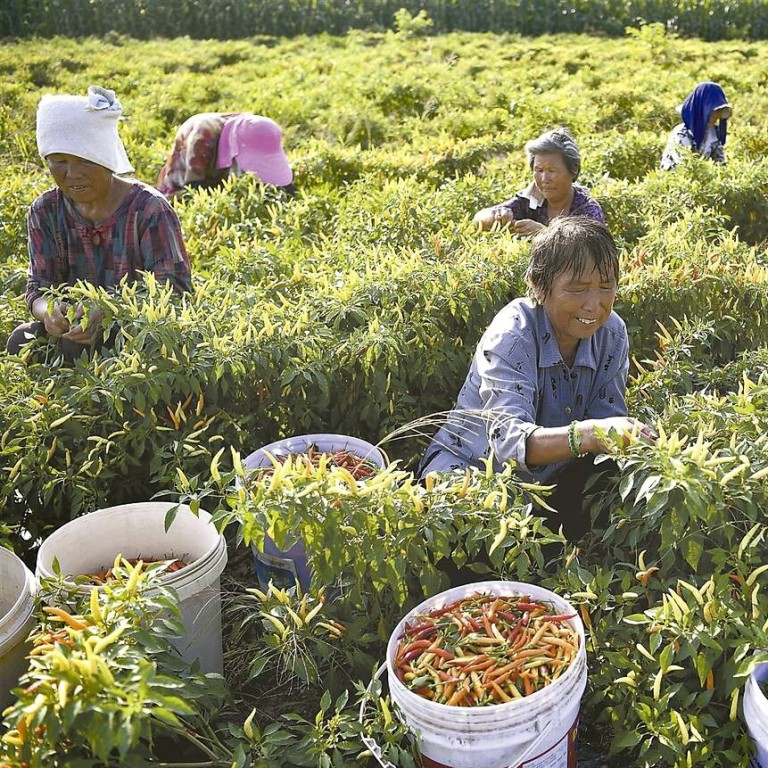
China’s ageing rural peasants labour into their twilight years as pensions ‘cover only oil and salt’
- The lack of support for elderly rural residents has become a worsening socio-economic problem for China amid its rapid urbanisation push
- Decades of aggressive family-planning measures mean one out of four residents in the countryside will be older than 60 by 2025
Chen Yunfeng, the chief of Yancang village in Henan province, has grown dismayed by the disadvantages that ageing rural peasants face in Chinese society.
“We plant grains, but grains are cheap,” Chen said while puffing cigarettes under a no-smoking sign in his little office. “And we are getting old, but there’s little welfare.”
According to Chen, who is in his late fifties, a peasant from the village can receive a monthly pension of just 112 yuan (US$16) after the retirement age of 60 – a tiny sum that is well below the average daily wage in Chinese cities and far from enough to support even a frugal rural lifestyle. It is also much lower than the national average pension payment of 2,000 yuan (US$290) per month for retirees from urban jobs.
The lack of adequate pensions for China’s rural residents is not a new issue. A secure retirement pension remained a privilege reserved solely for urban residents across the country until 2009, when then-president Hu Jintao and then-premier Wen Jiabao started to build up a national pension system for rural residents.
The rural pension system was merged into a nationwide scheme covering rural residents and urban residents who are self-employed or unemployed. The pension level varies in different regions but is generally much lower than that for urban residents. In Zhengzhou, the provincial capital of Henan province, for instance, the average pension for those enrolled in the urban and rural residents pension scheme was just 243 yuan per month in 2019, or less than a tenth of the 2,928 yuan for those in the urban corporate employee programme.
In most parts of rural China, the elderly must continue to rely on their own labour, their children or their savings in their twilight years. The lack of financial and other support for the country’s old peasants has become a worsening socio-economic problem amid the rapid process of urbanisation and the rapid ageing of the overall population.
A horrific incident cast a spotlight on the problem in May, when a man in Shaanxi province attempted to bury his bedridden mother alive because she had become incontinent and a burden to care for. The 79-year-old woman was eventually saved, and the man was arrested, but the case set off a nationwide debate on who will look after China’s growing number of elderly residents in rural areas.
In the country as a whole, a recent report by the Chinese Academy of Social Sciences predicted that one out of four residents in the countryside will be older than 60 by 2025, totalling about 124 million people – roughly the population of Japan.
Peasants have also made contributions to the country, but their treatment by the state is very different from that for retired public officials and urban workers
Ma Wenfeng, a senior analyst with Beijing Orient Agribusiness Consultant, said the lack of adequate pensions for Chinese farmers is severely restricting Beijing’s efforts to create a unified consumer market, in large part because more than 40 per cent of the country’s households are forced to save up enough to fund their old age.
“A monthly cash handout of 100 yuan or so certainly can’t make all ends meet, meaning peasants have to keep farming small plots of land for survival even when they are really old,” Ma said. This, in turn, has adversely affected agricultural productivity in China.
“The state gives farmers just 1,000 yuan per year as a pension, which is enough to cover only oil and salt. Peasants have also made contributions to the country, but their treatment by the state is very different from that for retired public officials and urban workers,” a citizen from Hunan was quoted as saying.
An increase in rural pension payments would require a significant injection of fiscal resources, but the fiscal situation in many parts of China is under great stress due to the coronavirus pandemic and the broad economic slowdown.
According to an academic paper published last month by researchers led by Xu Qing, a professor with the Shanghai University of Finance and Economics, one risk for China’s rural pensions is the system’s overreliance on fiscal subsidies, making even the current low-level of benefits “unsustainable”.
“People’s expectations of increasing fiscal subsidies are in contradiction with the fiscal revenue slowdown,” they wrote.

